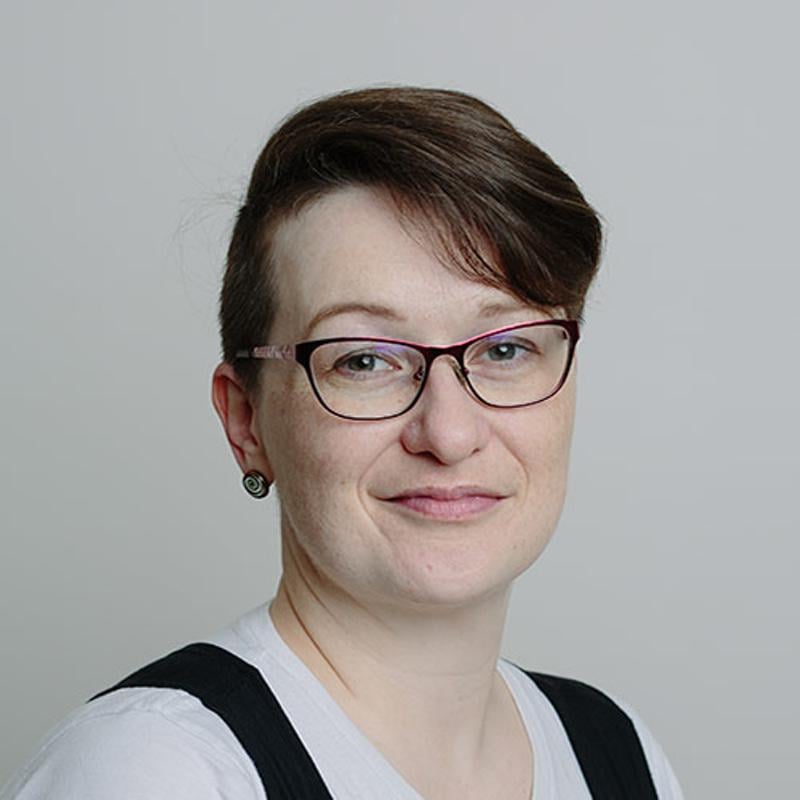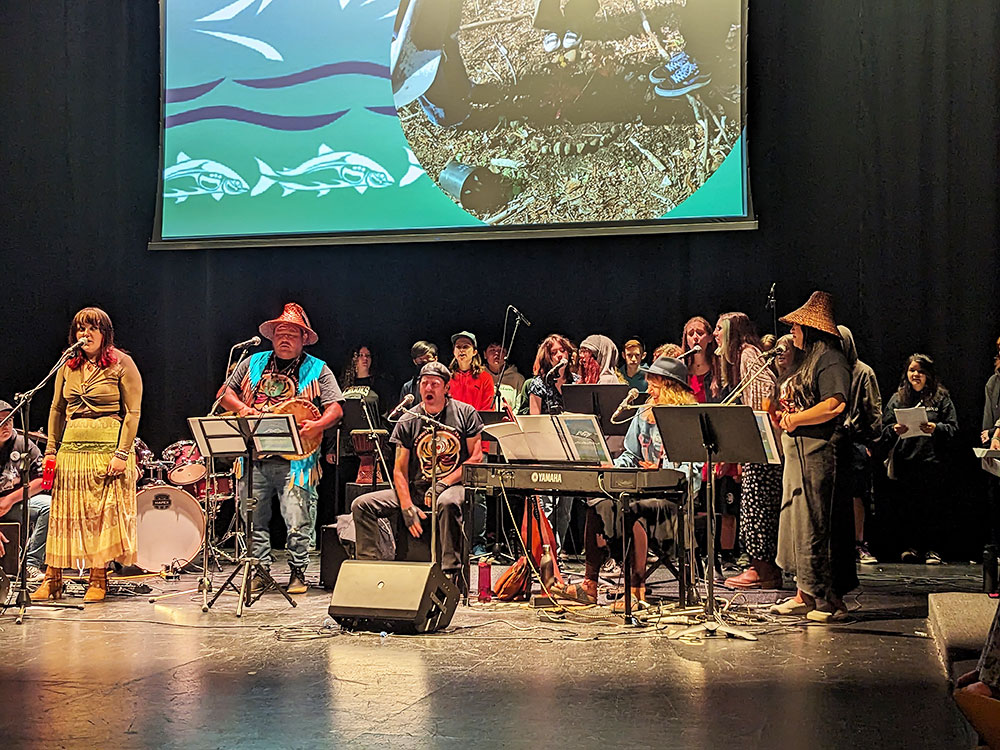Chilliwack high school students shared a lesson in restoration and reconciliation through song on June 21, National Indigenous Peoples Day, by performing a bilingual English and Halq’eméylem song they co-wrote with one of the last remaining fluent Halq’eméylem speakers.
Since February, 55 Grade 10 students at Imagine High Integrated Arts and Technology Secondary have been participating in a stream restoration project that encompasses elements from their math, art, social studies and science curricula.
The focus has been on Chilliwack Creek and its tributaries, with lessons about the ecosystem, the historical and cultural importance to the 19 Stó:lō First Nations, and the ongoing ecological impacts of colonization on the watershed.
Students have also been out in the field once a week this semester with SAY Lands, the land management office for the Skowkale, Aitchelitz and Yakweakwioose First Nations, helping to create a trail where the waters used to connect the three nations by canoe. Canoe trips between the nations stopped after the Chilliwack River was redirected upstream by settlers in the 19th century.
The students have been helping to physically restore one of the creek’s three tributaries by removing garbage, planting hundreds of native trees and plants, removing invasive plants and bringing in tree stumps to help rodents and reptiles feel at home.
“I don’t know if the students know, but in a way they’re making history themselves by participating in this project,” said Vivian Zeng, the students’ arts and humanities teacher at Imagine High.
“They’re creating differences in the world for this generation, so that future generations can follow and continue with truth and reconciliation of bringing back the land and paying respect to the people that were here before us.”
The students have also been working with Éy St’élmexw St’elt’ílém, also known as Good Medicine Songs, to write a bilingual Halq’eméylem and English song called “Listen to the Stream/Xwelelam te Stótelō.”
It is this song that eight Grade 10 students performed at the Voice of the Stream concert, along side Éy St’élmexw St’elt’ílém language carriers and musicians Xotwes Jonny Williams, Sulisulwut Bibiana Norris and Lori Kelly; settler musicians Holly Arntzen and Kevin Wright; and Siyamiyateliyot Elizabeth Phillips, the last fluent Halq’eméylem speaker in the Cheam First Nation.
The song, which has words in English followed by their translation into Halq’eméylem, talks about the voice of the stream and the importance of listening to the waterways that provide us with fresh water, a necessity of life for everything in the ecosystem.
Stó:lō as 'river' in Halq’eméylem
Musician Xotwes Jonny Williams, who began learning his language in adulthood, said it was honour to help increase the usage and understanding of Halq’eméylem, the upriver dialect of the Stó:lō nations on the Fraser River. Stó:lō means “river” in Halq’eméylem.
“When I first started learning my language in ’97, I had leadership tell me and other students it’s a waste of our time to learn our language. Who are we going to talk to?” said Williams.
Language loss was just one impact of colonization and the residential school system, where First Nations, Métis and Inuit children were abused for speaking their own languages. First Nations communities are now in a race against time to restore and revitalize hundreds of their languages before they disappear.
“To be able to share our Halq’eméylem language and culture and history now is that honour and pride,” said Williams.
Arntzen and Wright are members of the band the Wilds and co-founders of Artist Response Team, a Vancouver-based music production team that focuses on creating music with ecological themes with kids and youth in B.C. and beyond.
They are also the co-founders of Éy St’élmexw St’elt’ílém along with Phillips and T’it’elem Spath Eddie Gardner, Lolehawk Laura Buker and the late Stelomethet Ethel Gardner of the Skwah First Nation, creating and performing bilingual Halq’eméylem and English songs since 2017.
In March 2020 Éy St’élmexw St’elt’ílém were supposed to have their inaugural concert with students from McCammon Elementary and Chilliwack Landing Preschool, but the concert was cancelled at the last minute due to the COVID-19 pandemic. Videos of their dress rehearsal are available on YouTube.
This past April, Éy St’élmexw St’elt’ílém members met with Imagine High students in the school's stream restoration and rock band project to create the bilingual song using statements from the students about the knowledge and experience they gained this semester. The musicians and students crafted the music and lyrics together, and Éy St’élmexw St’elt’ílém translated the English into Halq’eméylem.
“To have children and young people singing in the language is a way of connecting them to the land, and to the Stó:lō people and to the body of knowledge,” said Arntzen, adding learning phrases in Halq’eméylem is an act of reconciliation.
“It also really thrills me to have young people involved because it connects their families. Their families care deeply about their kids, and when their children are speaking and singing, they listen. So it's a way to engage the broader community, people of all backgrounds.”
The concert and the partnership between the school and Éy St’élmexw St’elt’ílém is sponsored by the University of the Fraser Valley, Chilliwack School District, Interchange Recycling and Tire Stewardship BC, the latter two of which have been supporting Artist Response Team’s work with schools for over a decade.
In addition to singing the song they created, four other bilingual songs were performed and the students shared their stream restoration final projects, which included scientific research posters and art pieces including models, poetry and stories.
The concert will be available on Shaw Multicultural, channel 4 in the Lower Mainland, on June 25. The Artist Response Team will also be releasing videos of the performance and students’ presentations on their blog this summer.
Williams hopes the audience will come away with a better understanding of and appreciation for Halq’eméylem and for the care and protection of the land itself.
Even before he began singing with Éy St’élmexw St’elt’ílém, Williams had a dream for Halq’eméylem songs.
“I would talk to my parents, friends or my grandma, and I would say, ‘It really would be cool to be able to see Halq’eméylem sung in big arenas and with all different instruments,’” he said.
“That was always a vision of mine and it’s started to come true. To be part of that is amazing.” ![]()
Read more: Indigenous, Education
















Tyee Commenting Guidelines
Comments that violate guidelines risk being deleted, and violations may result in a temporary or permanent user ban. Maintain the spirit of good conversation to stay in the discussion and be patient with moderators. Comments are reviewed regularly but not in real time.
Do:
Do not: